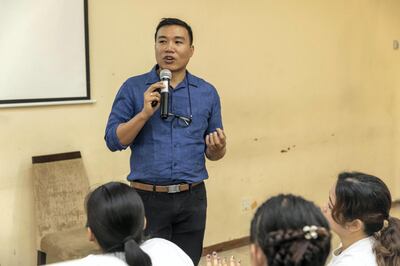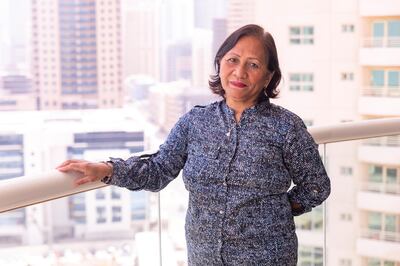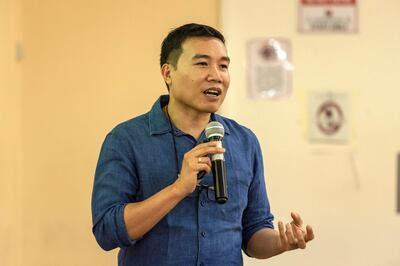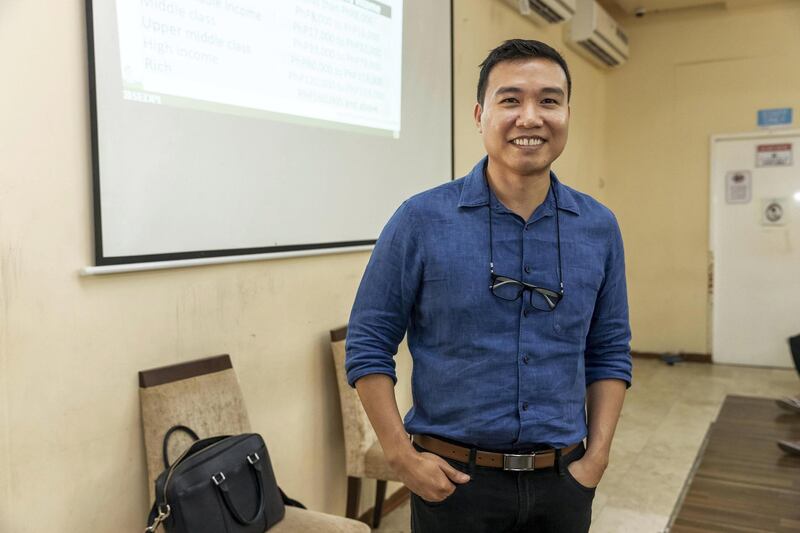Personal finance expert Vince Rapisura’s main message to Filipinos working overseas can be summed up in his tagline “Ang pagyaman, napag-aaralan”, which means wealth can be learnt.
“You can learn how to be rich. It’s not something you gamble on. It’s not something that you purely rely on luck,” says Mr Rapisura, who offers a financial literacy training programme for low-income overseas Filipino workers in 10 countries, including the UAE.
Money management is certainly needed in the Filipino community. As a professor, author, social entrepreneur and personal finance coach, Mr Rapisura cites a few sobering statistics crowdsourced through his blog last year: 80 per cent of Filipinos working abroad have inadequate emergency savings; 30 per cent do not prepare budgets; 25 per cent do not have life insurance and 8 per cent are overburdened with debt.
Those figures back up the 2014 Standard & Poor’s Global Financial Literacy Survey, which found only 25 per cent of Filipino adults are financially literate — lower than the global average of 31 per cent among 143 countries.
Mr Rapisura, however, has a message of hope, helping Filipino migrants develop a long-term financial plan and get out of a cycle of debt. He encourages investing in social enterprises in the Philippines to grow their capital and have the option of returning home. By changing views and habits, he believes Filipinos can become financially savvy.
“Usually they use [money] for consumption, so we want to have a shift and encourage them to use it for investments,” says Mr Rapisura, who has been a microfinance and social entrepreneurship professor at the prestigious Ateneo de Manila University for 15 years. “In particular we promote social investments and social enterprises. These are organisations that have a social mission and at the same time provide decent financial returns.”
Mr Rapisura established Social Enterprise Development Partnerships Inc, in 2004, which has trained more than 30,000 people and managed social investments worth close to 325 million pesos (Dh22.9m).
He teaches financial literacy to overseas Filipino workers in the Leadership and Social Entrepreneurship (LSE) programme under Ateneo’s School of Government. The six-month programme started in Rome in 2008 and has since expanded to 20 cities worldwide, including the UAE where it has run for seven years. Attendees pay Dh1,500 for 12 sessions and there are 3,500 alumni members globally, of which 443 are in the Emirates, according to Cristina Calaguian, president of the UAE alumni association of LSE.

Mr Rapisura was in the UAE earlier this month to deliver two financial literacy training sessions to this year's 125 participants, including more than 20 domestic workers in Abu Dhabi and Dubai. He also taught a free session to 100 workers in dire financial straits at the Philippine Overseas Labour Office and gave away copies of his 2016 book (L) Earning Wealth: Successful Strategies in Money Management.
“It’s really difficult giving a message of hope to [the distressed workers],” says Mr Rapisura. “I tell them, you’ve reached rock bottom and take a look at that as the lowest that you can go and any point from here would be going up.”
He focuses on two investment opportunities in the Philippines: cooperatives offering microfinance and social enterprises in the agricultural sector. Even for those struggling with their finances, he says these opportunities are a good place to start.
“They can save, they can provide share capital to the cooperative and get a chance to get a loan to fund their livelihood,” says Mr Rapisura.
He focuses on a mindset change, asking programme participants to set clear life goals to determine their financial plans.
“A lot of people come up to me and ask, ‘what’s your hot investment tip?’ And I always tell them, unless you tell me your purpose, unless you tell me why you want to earn from that investment, it would be very difficult for me to provide an appropriate financial product for you,” he explains.
To begin with, Mr Rapisura advocates a 5-15-20-60 budgeting rule: 5 per cent for insurance, 15 per cent for savings, 20 per cent for investments and 60 per cent for expenses.
“When I tell them, that as a rule of thumb, [only] half of your salary should go towards your lifestyle, they get shocked,” says Mr Rapisura. “I encourage them to work towards that slowly, [rather] than make a crash behavioural change.”
He strongly discourages the use of loans, and distinguishes between “good debt,” such as investments, and “bad debt,” such as non-productive loans.
“Loans are expensive instant gratification,” he says. “Saving is the postponement of the pleasure of spending. You have to know what pleasures you’re aspiring to and make that the motivation to save and invest.”
Mr Rapisura says within 18 months to two years of completing the programme, he sees “significant change in [the] financial behaviour” of his graduates.
“The main change is that about 90 per cent of those who attend our training now have their financial plan. When they entered, only 28 per cent would say they have a financial plan,” he says.
Eighty-five per cent also actively save after the programme, compared to the 54 per cent baseline and half have enough emergency savings, compared to 18 per cent before they took the course.

Teresita Uy, an administrator earning Dh5,000 a month and one of this year’s LSE participants, says she learnt to keep track of her expenses and save enough to finish building a house on land she bought four years ago in the Philippines.
“I never had a goal, I never had a plan. What money I had would just come and go,” says Ms Uy, 58, who also cares for her nephew.
With six children — now aged between 23 and 33 — it is no surprise money has been tight. The sole breadwinner of the family was Ms Uy’s husband, who worked as a seaman, but they are now separated.
They put three of their children through college with the help of Ms Uy’s sister and brother-in-law. Now Ms Uy is returning the favour by taking care of her sister’s four-year-old son in Dubai.
“I’m trying to invest still, but slowly, slowly, because I’m not earning that much,” says Ms Uy, who has been in the UAE for nearly five years. She hopes that after finishing the house, she will be able to earn passive income through rent.
The Philippine’s property boom is one of the investments Mr Rapisura suggests cashing in on — but not in Manila.
“The investment in Manila is eight years return-on-investment and the one in the province is only three years return-on-investment,” he says. Condominiums are even less lucrative with a 20 to 25-year return.
He warns against high-return investment opportunities that sound too good to be true. “Filipinos have a tendency to have the crowd mentality. If somebody says ‘this is working’ and they give their testimonials, they get attracted to it, so a large crowd follows and the scammers benefit,” he says.
Instead, Filipinos should look at “security, liquidity and then returns,” Mr Rapisura advises.

Lou Olvido-Parroco, another LSE participant, says she fell into that trap. She and her husband took out a loan to buy a condo in Manila a few years ago, which remained empty for three years because they could not get it rented.
“It was a marketing ploy that was not close to reality,” says Ms Olvido-Parroco, 45. “Had we been more financially aware … for sure we would have made better decisions.”
A UAE resident for 22 years, Ms Olvido-Parroco worked as a human resources director for an oil and gas company before taking a break to enrol in the LSE course. Now she is saving to move back to the Philippines with her husband and children, ages 13 and 17, and plans to set up a preschool and a wellness spa there.
This is one of the programme's goals — to ultimately shorten the migration process. Often, Filipinos travel abroad, leaving their families behind and sending remittances back without a specific financial target in mind.
“What happens in the Philippines is there’s no planning involved and the goal is a moving target,” Mr Rapisura says.

Mr Rapisura has strong words for those burdened by supporting their families back home. He says they should only support others if they are financially stable, have adequate insurance coverage and are at an appropriate financial life stage.
“Number one is they have to have adequate emergency savings, which is equivalent to nine months of their expenses,” he says. “With that alone, 90 per cent of them wouldn’t qualify to help financially.”
He says that priorities should start with their children, followed by their parents only “if they are no longer financially capable of supporting themselves”.
“Your spouse is not your financial responsibility,” he says bluntly. “So if your spouse is no longer productive and is not sharing with your responsibility and becomes a burden, I think it’s time to call it quits.”
The expectation of sending money home for an unspecified time period is both unreasonable and unproductive, says Mr Rapisura.
“In the Philippines, 10 per cent of our GDP comes from overseas Filipino workers’ money. If we are able to influence them to use their money for something that’s more productive, then it could greatly help the Philippines’ economy," he says.
“They don’t have to aspire to an extravagant life — just a more affordable one,” he adds. That, too, can be learnt.









